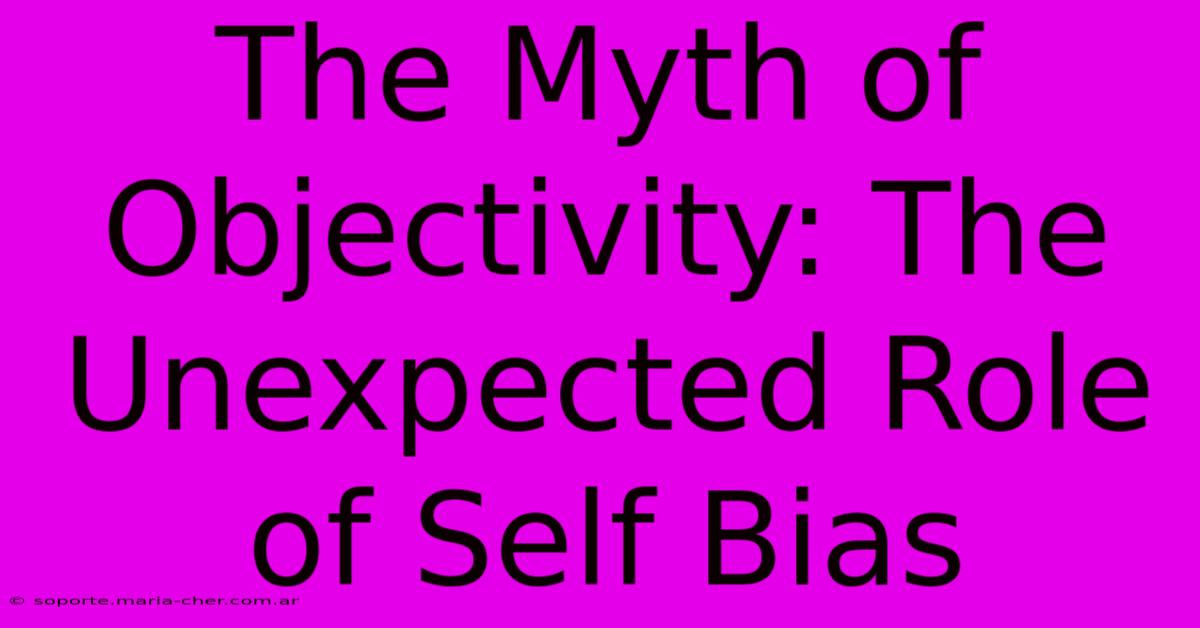The Myth Of Objectivity: The Unexpected Role Of Self Bias

Table of Contents
The Myth of Objectivity: The Unexpected Role of Self-Bias
We strive for objectivity. In our personal lives, professional endeavors, and even scientific pursuits, we aim for unbiased judgment. Yet, the reality is far more nuanced. The human brain, wonderfully complex as it is, is inherently susceptible to bias, and self-bias plays a surprisingly significant role in shaping our perceptions and decisions. This article delves into the myth of pure objectivity, exploring the pervasive influence of self-bias and its implications.
Understanding Self-Bias: More Than Just Ego
Self-bias isn't simply about arrogance or inflated ego. It's a deeper cognitive phenomenon encompassing several interconnected biases, all stemming from our inherent need to maintain a positive self-image. This self-preservation mechanism, while often beneficial, can lead to distorted perceptions and flawed judgments. Key components include:
1. Self-Serving Bias: Taking Credit, Avoiding Blame
This is perhaps the most recognizable form of self-bias. Self-serving bias involves attributing successes to our own abilities and efforts while blaming external factors for failures. Think about that project at work – did you celebrate your contribution to its success? Did you readily acknowledge external obstacles when it fell short of expectations? This tendency to protect our self-esteem can hinder honest self-assessment and limit our growth potential.
2. Confirmation Bias: Seeking Validation, Ignoring Contradictions
We tend to seek out and favor information that confirms our existing beliefs and biases, while dismissing or downplaying information that challenges them. This confirmation bias creates echo chambers, reinforcing our pre-existing notions even when confronted with contradictory evidence. This is particularly relevant in today's information-saturated world, where we can easily curate our online experiences to align with our pre-conceived ideas.
3. Optimism Bias: Overestimating Positive Outcomes
Optimism bias, a pervasive human tendency, leads us to overestimate the likelihood of positive events happening to us and underestimate the probability of negative ones. While optimism can be motivating, an excessive dose can lead to poor risk assessment and unrealistic expectations, potentially leading to disappointment and setbacks. This can be particularly problematic in situations requiring careful planning and risk mitigation.
The Consequences of Unchecked Self-Bias
The implications of self-bias extend far beyond individual experiences. In professional settings, self-serving bias can hinder teamwork and effective collaboration. In scientific research, confirmation bias can compromise the integrity of studies and lead to flawed conclusions. In personal relationships, unchecked optimism bias can lead to unrealistic expectations and disappointment.
Overcoming Self-Bias: A Path to Greater Objectivity
While we can't entirely eliminate self-bias – it's a fundamental aspect of human cognition – we can certainly mitigate its influence. Here are some strategies:
- Seek Diverse Perspectives: Actively solicit feedback from others, especially those with different viewpoints. This helps counter the effects of confirmation bias.
- Practice Self-Reflection: Regularly assess your own decision-making processes and identify potential biases. Journaling can be a valuable tool in this process.
- Embrace Constructive Criticism: Don't shy away from feedback, even if it's critical. Use it as an opportunity for growth and self-improvement.
- Develop Cognitive Flexibility: Train your mind to consider alternative explanations and perspectives, challenging your default assumptions.
Conclusion: Embracing the Imperfectly Objective Self
The myth of pure objectivity is just that – a myth. Recognizing the pervasive influence of self-bias isn't about self-criticism; it's about self-awareness. By understanding how self-bias operates and employing strategies to mitigate its effects, we can strive for greater objectivity and make more informed decisions, both personally and professionally. The journey towards objectivity isn't about eliminating bias entirely but about acknowledging its presence and actively working to minimize its impact on our lives.

Thank you for visiting our website wich cover about The Myth Of Objectivity: The Unexpected Role Of Self Bias. We hope the information provided has been useful to you. Feel free to contact us if you have any questions or need further assistance. See you next time and dont miss to bookmark.
Featured Posts
-
The Ultimate Collection Of 9 Signature Quotes To Boost Your Email Presence
Feb 04, 2025
-
Unleash Your Wix Potential The Mailer Lite Integration That Will Transform Your Business
Feb 04, 2025
-
Breaking News Top Oncologist Unveils The Key To Effective Cancer Treatment
Feb 04, 2025
-
Decoding The Devilish Symbolism The Bulls Logos Hidden Upside
Feb 04, 2025
-
Revealed The Secret To Impeccable Flower Centerpieces At Unbelievable Prices
Feb 04, 2025
